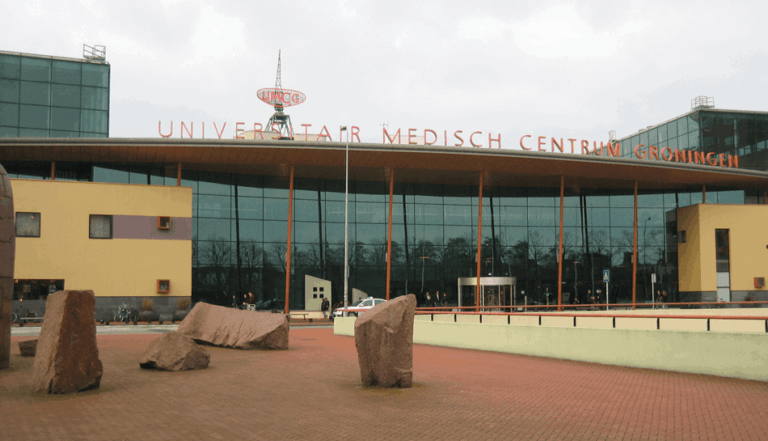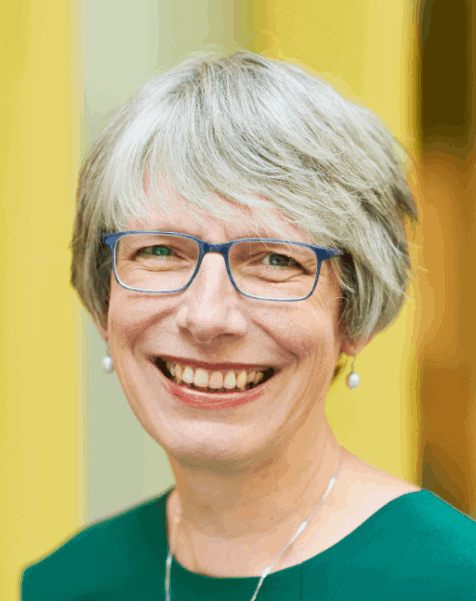
Department of Genetics
Universitary Medical Centre Groningen
Post Box 30.001
9700 RB Groningen
Netherlands
Lead

Pr Conny van Ravenswaaij-Arts
Telephone: +31 (0)50 361 7100
Fax: +31 (0)50 361 7231
Contact details:
- Developmental Delay diagnostics: klin.genetica@umcg.nl
- CHARGE syndrome: CHARGE@umcg.nl
- Chromosome 6 disorders: chromosome6@umcg.nl
- Phelan-McDermid syndrome: 22q13@umcg.nl
Scope
The areas of expertise of the University Medical Centre Groningen (UMCG) ITHACA European Reference Network (ITHACA ERN) centre are developmental delay and multiple congenital anomaly syndromes. This includes all developmental delay and multiple congenital anomaly syndromes caused by (rare) monogenic or chromosomal abnormalities. The UMCG ITHACA ERN centre aims to combine patient care, research and education in a multidisciplinary setting with an emphasis on personalized care.
Service to patients
The regional population covered by the UMCG ITHACA ERN centre numbers more than 1.7 million inhabitants. In addition, a significant number of the patients seen in the centre are referred from other regions of the Netherlands or from abroad. The centre is the tertiary referral centre for top clinical care, offering efficient diagnostics (clinical, biochemical and genetic), a multidisciplinary approach (genetics, paediatrics, neurology, psychiatry, ear-nose-throat (ENT), ophthalmology), personalized care and follow-up in collaboration with regional disciplines. The centre also conducts research aimed at improving patient care. Our studies are patient-oriented, and the results have led to guidelines and recommendations for rare syndromes (including CHARGE syndrome and Phelan-McDermid syndrome) and registries/databases (www.chd7.org, www.chromosome6.org).
Organization of the Groningen Centre
The UMCG is the tertiary referral hospital for complex, highly specialized care for the northern provinces of the Netherlands. Collaboration with regional hospitals is essential to keep routine patient care close at home while also concentrating complex care at the UMCG. The UMCG is also allied with the University of Groningen and its Graduate School of Medical Sciences (GSMS) for the education of medical and PhD students. The UMCG has 46 centres of expertise recognized by the Dutch government and the Netherlands Federation of University Medical Centres (NFU). Two centres are part of the UMCG ITHACA ERN: the multidisciplinary CHARGE clinic and the Clinic for Rare Chromosome disorders, Uniek. The UMCG is also home to a multidisciplinary clinic for patients with developmental delay: the Groningen Centre of Expertise on Developmental Delay (Groningen Expertisecentrum Ontwikkelingsachterstand, GEO clinic).
- CHARGE clinic: CHARGE syndrome is a variable multiple congenital anomaly syndrome. The incidence is approximately 6 per 100,000 newborns. The UMCG CHARGE clinic is the only centre of expertise for CHARGE syndrome in the Netherlands and coordinates the care for children and young adults with CHARGE syndrome. Patients are seen every one to three years by a team of specialists that includes (at minimum) a clinical geneticist, an ENT surgeon and a rehabilitation specialist. Depending on the patient’s age and specific problems, this team can also include a paediatric endocrinologist and a team specialized in communication and language development in children (CSK team). Other specialists can be involved in evaluation and/or in giving advice. A tailor-made programme is offered to the patient at each visit. The clinic has follow-up records on almost 120 patients. Due to the large amount of information we collect, various research projects have been conducted or are on-going. For more information please see: nl/research/genetics/research/chargesyndrome.
- Uniek, outpatient clinic: This clinic started as a follow-up clinic for rare chromosome disorders and now provides structured follow-up for all patients with rare chromosome and monogenic disorders. The main aim of the clinic is to improve surveillance of patients with rare chromosomal and monogenic disorders by collecting as much information as possible and providing advice based on experience and information from the literature. Guidelines on several chromosomal syndromes are, or have been, produced. Together with Unique, the international parent support group, informational brochures are translated into other languages and new brochures are published. Translational and clinical research is initiated by the clinic or performed within a research network. The main focus of clinical research at the moment is Chromosome 6 disorders and Phelan-McDermid syndrome.
- Chromosome 6 Project: Knowledge about the effects of chromosomal changes is important to ensure the best possible guidance and treatment for patients. We are currently running a unique social media-based Chromosome 6 Project that has resulted in a parent-oriented database with an online questionnaire available in many languages. By collecting detailed information, we hope to link specific disease characteristics to specific regions of chromosome 6. Our goal is to provide tailored information on rare chromosome aberrations to parents and professionals via an open-access interactive webpage. For more information please see: chromosome6.org
- Phelan-McDermid syndrome: Phelan-McDermid syndrome (22q13 deletion syndrome) is one of the more common developmental delay syndromes, and more than 80 children and 40 adults are registered at our centre. The neurological features, which affect development and behaviour, are caused by deletions or mutations of the SHANK3 We previously studied the development and behaviour of Dutch children with Phelan-McDermid syndrome, as well as the effects of administering intranasal insulin on development and behaviour in these children. Our current research focuses on the natural history of development and behaviour in adolescents and adults, psychiatric phenotypes in these children and adults, and treatment strategies for psychiatric disorders in adults. We are also working on the development of a European guideline for Phelan-McDermid syndrome. For more information please see: http://www.rug.nl/research/genetics/research/phelan-mcdermid-syndrome/
- GEO clinic: The aim of the Groningen Centre of Expertise on Developmental Delay is to perform efficient diagnostics in a patient-friendly manner. A multidisciplinary team is involved in complex cases. Genetic diagnostics are performed early in the diagnostic trajectory – SNP array and whole exome sequencing with a panel of around 1300 developmental delay genes, followed by open exome analysis, if needed. Additional neurologic, psychiatric, ophthalmic, biochemical, neurophysiological and neuro-imaging investigations are performed when necessary. GEO is visited by approximately 300 patients each year, and a diagnosis can be made in 35% of patients, predominantly via genetic testing.
